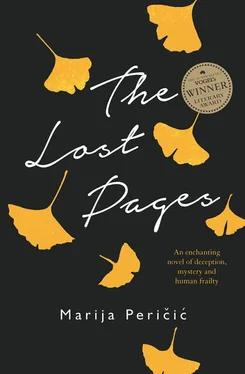I was expecting a volley of questions from him during the question time at the end, and braced myself, but he remained silent; indeed, he seemed to have disappeared. Now I could see only a gap in the crowd where his dark head had been. As soon as I left the lecture hall, however, there he was again. He lunged out from the shadows of the corridor and tried to block my way, but I was able to dodge around him. I heard him scurrying after me, calling out my name and then an apology. I walked on. He followed me outside, where he fell into step beside me on the footpath and began to talk about my novel, which had had some success the year before. He flattered me in an ingratiating tone that I hated, but he piled his pretty words up and up, and soon I had fallen into his trap. I am as vain as the next man and, because I have no grounds for pride on any other front in my life, my writing is my weak spot. Later, when everything lay ruined around me, I thought often about how my life would have been different had I not spoken to Franz [1] In the manuscripts Franz Kafka appears as ‘F.K.’ or ‘F-’; we have replaced this with his first name in the interest of consistency.
that night, had I been able to resist him.
He walked with me all the way to my house, and when we were at the door he thrust a sheaf of papers at me—his short stories, he said. He asked me to look over them, perhaps show them to my publisher. This had happened to me a good deal since the success of my novel; I admit that I always felt a bloom of pleasure at the request, especially with the inevitable realisation that the stories or poems or novels that were pressed on me were no good—or at least nowhere near as good as my own writing. I acceded to Franz’s request in an offhand way, and then promptly lost the stories among the drifts of paper that covered my desk.
A few weeks later, I found his short stories again and read them, not remembering at first what they were. As my eyes passed over the pages a slow horror grew in me, sending my body cold. The stories were not merely good; they were exceptional. I read them again, and then sat for a long time with the papers in my hands. I turned to the title page and stared at the name printed there: Franz Kafka . How that name would come to haunt me.
I could tell you that I was moved and instantly sent the works to Theodor, my publisher; that I hastened to have Kafka’s work brought out into the world; that I eagerly welcomed what was to become such an important addition to the modern German canon. I could tell you that I felt pleased and proud to bring his work to light, but it would be a lie. All I felt was the sick poison of jealousy, the panic of self-preservation, and a determination to stop Franz at all costs. To show these stories to Theodor would have meant certain death for my literary career, which was at a critical stage. I had had one success, it was true, but now I faced the enormous pressure of cementing my literary reputation with an equally brilliant second work. I began to have nightmares about Franz: of him meeting Theodor, and the two of them conspiring to thwart me; of Theodor telling me that he was no longer interested in me; of Franz taking my place. I would wake from these dreams breathless and rigid. A terrifying abyss seemed to open in front of me; if I lost my status as a writer, what did I have left?
I wanted to destroy Franz’s stories, and I thought often about it, but I had not yet sunk quite so low. Instead I stuffed them into the drawer of my writing table and locked it. I can say nothing much in my own defence, only that I have not been a fortunate man, nor a happy one, and I was fixed on defending to the death what little I had wrested from the world.

It turned out that even if I had burned the stories, as I had wanted to, it would not have made the slightest difference. Even without my help, they found their way into print. Some months later, I was invited to the launch of the new edition of Hyperion , to which I had contributed, and in which I saw Franz had published his first story. I had been reluctant to attend the party, knowing there was a strong likelihood that both Franz and Theodor would be there. The thought of being present as Theodor and Franz met, watching them smiling at one another and shaking hands, made me suffer with the hot jealousy of spurned love. But the alternative was to stay away from the party, which would mean that this meeting would take place out of my view, leaving my imagination free to adorn and amplify, as I knew it would, to the point of madness. I decided that, no matter now distasteful the occasion might be, it was better to be present. It was also prudent, I knew, to appear pleased at the coming union, and to keep Franz close—to make a friend of him, in fact. I braced myself, and on that Thursday evening I set out, a sick feeling in my stomach.
The party was being held at the Café Slavia. I had arrived on foot, walking for part of the way along the Moldau, the slide of its black water keeping pace with my step. It was a clear night, and cold, and the slick river was like a sheet of moving glass, the surface so smooth that the orbs of lamplight mirrored in it were no less solid and steady than the light of the real lamps high on the bank.
Couples and small groups hustled along either bank on their way to the theatre or the opera, and the swinging skirts of the women corresponded in some musical way with the swaying of the trees above their heads. Ahead of me, I could see the bright lights spilling from the café windows, making orange tongues on the footpath. When I arrived at the Slavia, my legs were already aching from the walk, and I longed for a chair, but still I stood, composing myself, on the corner of the street. I could feel the compact bulk of the National Theatre rearing up into the empty sky behind me, compressing the air around it. The dark awnings above the café windows swayed like flags. The windows were uncurtained, and I saw the little tableau of a party scene. A woman held a small glass poised at her lips, her pale wrist an elegant curve against her dark-clad breast. A man leaned over her shoulder in the act of whispering something to her. Behind her, two men embraced and clapped each other on the back in a syncopated pattern.
Bursts of laughter and music trickled out of the café onto the street. Then the doors swung open, letting out a blast of heat and noise, and two men came out onto the footpath. I saw them look at me and felt immediately ashamed of my solitary watching. I caught the doors as they were swinging closed and plunged inside.
I had not even managed to find a drink for myself before I was set upon by a small group, eager to claim me. They clustered around and gave me their opinions of my novel and quizzed me on what I was writing now. While I spoke, I was the whole time surreptitiously looking around for Franz, but I could not see him. The room was very crowded and I felt an urgent need to find him. With difficulty, I extricated myself from the group around me and slowly struggled through the crush in search of him, impeded every few steps by someone wanting to congratulate me on my book or ask my opinion on their story in the magazine.
Stacks of Hyperion stood on tables. The idea of Franz’s story printed there beside mine roused a gnawing resentment that was hard to ignore. I tried to imagine how Franz must feel about his first publication. I remembered that, when I had first seen my own book in print, I had thought it to be the best moment of my life, and, looking back now, perhaps it was. The smooth and solid surface of the book, my book, had seemed to give off a radiant energy that was absorbed by the skin on my hands and fingers, and travelled up my arm into my chest, where it expanded to warm and relax me, as though it were a narcotic. I had taken up a copy, and gripped it first in one hand and then both, feeling its weight, the texture of the cover. I opened it and ran my fingertips and palms over the pages like a blind man. I held the book up to my face and fanned the pages and breathed in the smell of paper and ink. And it was not a question of just one book; the boxes on the floor of the publisher’s office were full of copies, the cover-pages and spines made unreal by their repetition. Theodor had laughed.
Читать дальше













